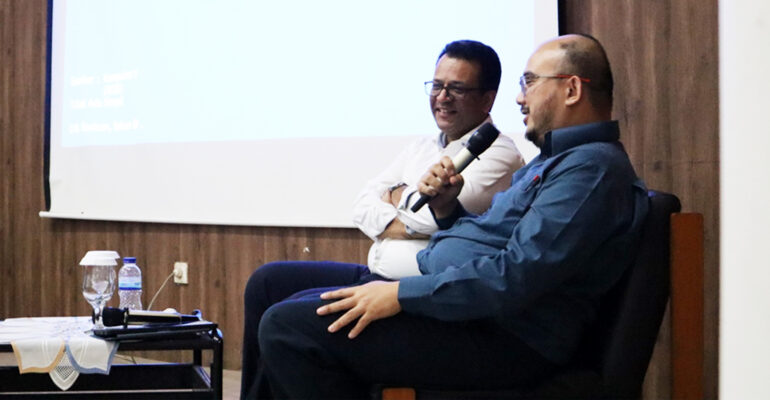Committed to Realizing Sustainable Aquaculture, Department of BDP IPB University Holds Visiting Lecture

Department of Aquaculture (BDP) IPB University held a Visiting Lecture program for three consecutive days (10-12/12). The program consisted of general lectures and workshops on aquaculture.
This activity aims to build a joint commitment between researchers, practitioners, and related stakeholders to develop knowledge and potential for the development of aquaculture in Indonesia.
In his opening remarks, Prof Fredinan Yulianda, Dean of FPIK IPB University said that collaboration between institutions, government, and academics must continue to be improved.
“IPB University continues to be committed to answering changes, developments, and challenges in the fisheries sector. The ability and improvement of facilities are very supportive to realize the common mission,” he said when delivering a speech at the Sumardi Sastrakusumah Auditorium, Faculty of Fisheries and Marine Science (FPIK) IPB University.
Through this activity, Prof Fredinan hopes that it can become a place for exchanging knowledge, ideas, and relationships to jointly realize sustainable aquaculture.
The Visiting Lecture program presents speakers with various backgrounds from researchers, academics, and practitioners in the field of aquaculture.
The first day of the program was filled with general lectures and workshops. The general lectures were presented by Dr Kartik Baruah and Dr Parisa Norouzitallab from the Swedish University of Agricultural Sciences, and Dr Fotini Kokou from Wageningen University and Research (WUR).
Dr Kartik Baruah said that the use of nutraceuticals such as some herbal components and natural feed enrichment can reduce stress and bacterial pathogenicity, as well as improve immunity and growth in fish.
“Nutraceuticals can be a solution to address challenges and problems in aquaculture, especially stress and disease,” Dr Kartik explained during his presentation titled ‘Stressceuticals Development in Aquaculture’.
Meanwhile, Dr Fotini Kokou in his presentation emphasized that the role of microbes is very supportive in aquaculture production. “In intensive aquaculture systems, the number of microbes in the water is very important to monitor. The role of microbes greatly affects the survival rate of fish so that it correlates with the productivity of aquaculture,” she explained through the material entitled ‘The Role of Microbes on Physiological Function of Aquaculture Organisms’.
Not only that, fish breeding was also a topic of discussion in this session. Dr Parisa Norouzitallab delivered the topic “Epigenetic Management in Aquaculture”. She explained, “Fish breeding with a focus on improving the genetic quality of fish with the latest technology is important to create superior seeds,” she explained.
The activity continued with a workshop filled by Dr Kartik Baruah, as well as lecturers of the BDP Department of IPB University, namely Dr Hasan Nasrullah and Prof M Agus Suprayudi. Focusing on the theme “Development of Effective Nutraceuticals in Aquaculture”, the workshop aimed to accelerate the transformation of the aquaculture sector in Indonesia.
Dr Kartik Baruah explained the topic on “RnD of Nutraceuticals in Aquaculture”. He said, “Nutraceuticals are natural compounds that not only improve the health of aquaculture organisms, but also provide additional benefits such as increased growth, disease resistance, and crop quality. Research and development (RnD) is the first step to deliver effective nutraceuticals innovation,” he said.
Meanwhile, Dr Hasan Nasrullah explained the topic “Nutraceutical Commercialization in Indonesian Aquaculture”. He said, “To encourage the growth of the national aquaculture industry, it is important to understand how nutraceuticals can be commercialized effectively,” he said.
Furthermore, he also discussed marketing strategies, regulations, and investment opportunities to accelerate the adoption of nutraceuticals in Indonesia.
Through the material “The Use of Nutraceutical for Functional Feed in Aquaculture”, Prof M Agus Suprayudi explained that functional feed enriched with nutraceuticals has been proven to increase production efficiency. “The integration of nutraceuticals in feed formulations can optimize growth, improve immunity, and reduce the environmental impact of aquaculture activities”, he explained.
This workshop is designed for academics, aquaculture practitioners, feed industry players, investors, and policy makers who want to explore the benefits of nutraceuticals to support the sustainability of the aquaculture sector. Through this workshop, participants are expected to gain theoretical insights and applicative practices that can be directly implemented in the field. (*/Nr) (IAAS/RUM)



